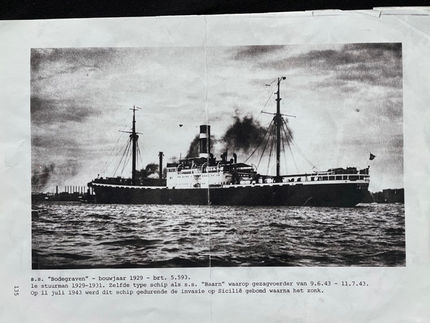I'm a paragraph. Click here to add your own text and edit me. It's easy.
I'm a paragraph. Click here to add your own text and edit me. It's easy.
I'm a paragraph. Click here to add your own text and edit me. It's easy.
Latest:

SS Bodegraven
Well I, I left to go to the ORT school in the morning and the streets were empty and I was told, “The Germans have invaded us.” Amsterdam was lucky. Because Rotterdam was completely destroyed. You know. Amsterdam was just two bombs. So when I got to the ORT School they said, the Germans have invaded us, we can’t teach you anymore. Because – now got home. So I went back to the orphanage. After five days we were waiting what was going to happen to us. We were very anxious to hear reports of the German invasion, you know? And, and we heard that the Dutch were completely unprepared. They hoped to become …Or to stay neutral as they stayed neutral in the First World War. Completely unprepared. So the Germans invaded quickly and May 15th then we were told, “Take your pyjamas and your best clothes, and leave [ inaudible] and on the Lijnbaansgracht in Amsterdam there were three buses ready. So we boarded the buses. And Truus Wijsmuller was there to see us and took us to the port of Ijmuiden which is the Dutch port on the North Sea. And she persuaded this captain of a cargo boat, called the “Bodegraven”. I’ve got a photograph of that too, to take us away, quickly. Which he did. The recollection of people who were with us, remembered that she left her handbag on board, but went back, wouldn’t come with us. Although she had an opportunity to go to England as well on the boat. She refused. And on my last impression of leaving is firstly were British soldiers were landing, to fight the Germans. And the last, the picture too of the harbour of Amsterdam. The Dutch Shell had big oil tanks there which the Dutch set on fire, because they didn’t want the oil to go into the German hands. So the smoke of these big oil refineries saw us off as we left. Soon after we had left the harbour, some German fighter planes came over. Luckily they had no bombs. They would have gladly bombed us, sank the ship. So I dived on the rescue boats and I wasn’t hit by the machine guns fortunately. Now the journey was… traumatic because we never knew what was going to happen, where we were going. No idea. And the sad part was an example of intolerance, because the Dutch crew was willing to give us some food. And all the orthodox people who were on the boat said, No, it’s not kosher; you can’t eat it. So for the days from leaving Holland until landing in Liverpool we had… dog’s biscuits and water, you know. We didn’t starve but the great under-, the great…understood, realised intolerance, you know, of the very orthodox not, not, not rising to the situation.
I’ve read quite a bit about her, this Truus Wijsmuller-Meijer. She was an extraordinarily refined woman. Aristocratic woman. And the children loved her dearly. And they wanted very much, you know as long as she was with them, you know, the children were - felt that it was their mother, you know, who was really travelling with them. And she also felt that she must reassure the children. So as a consequence, she left in her memoirs she says this. She left her handbag when she boarded the ship, she took her handbag and she left it on the board that the children should see. “I’m leaving the handbag. I’m with you here of course. I’ve still got a few things to do.










